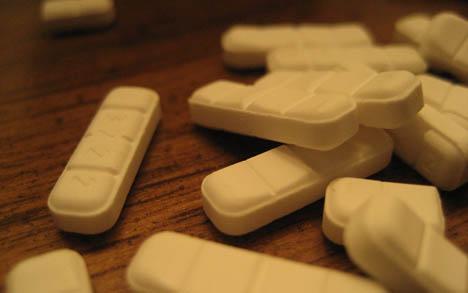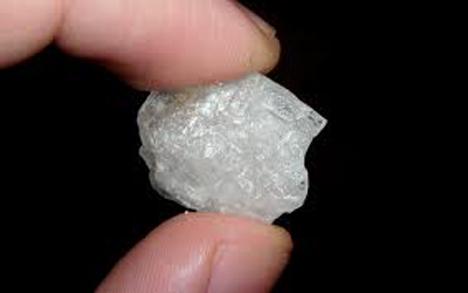| 1. |
 heroin
heroin
No surprise here: heroin’s addictiveness is the stuff of legend. As an opiate, it affects opioid receptors throughout the body and mimics endorphins, reducing pain and causing pleasure. Areas of the brain involved in reward processing and learning are stocked with tons of these opioid receptors, so when you inject heroin, you are basically training your brain to make you crave it. Pair that with nasty withdrawal symptoms and high fat solubility (which allows it to get into your brain quickly), and you have the most addictive drug in the world. An estimated 281,000 people received treatment for heroin addiction in the US in 2003, and according to the National Institute on Drug Addiction, a full 23 percent of people who have ever used heroin become addicts.
|
|
| 2. |
crack cocaine
Although crack cocaine and powder cocaine have similar chemical compositions and effects, smoking processed crack causes a faster, higher rush that lasts for less time (about 10 minutes, versus 15-30 for powder cocaine). The intensity of the high combined with the efficient method of ingestion—smoking—are the big reasons why addiction rates are dramatically higher for crack than they are for snorted powder. In 2010, there were an estimated 500,000 active crack cocaine addicts in the United States.
|
|
| 3. |
nicotine
Though nicotine doesn’t cause the rush of heroin or crack, it's biologically similar in a crucial way: it mimics a common neurotransmitter—so well that scientists named one of the acetylcholine receptors after it. Smoking regularly reduces the number and sensitivity of these “nicotinic” receptors, and requires that the user keep ingesting nicotine just to maintain normal brain function. There are a shocking 50,000,000 nicotine addicts in the US, and one in every five deaths nationwide are the result of smoking.
|
|
| 4. |
 benzodiazepines
benzodiazepines
There’s a reason your doctor will tell you to taper off these prescription anti-anxiety drugs (Valium, Xanax, Klonopin, et al) after taking them for awhile. Each one increases the effectiveness of a brain chemical called GABA, which reduces the excitability of many other neurons and decreases anxiety. Because benzodiazepines cause rapid tolerance, quitting cold turkey causes a multi-symptom withdrawal that includes irritability, anxiety and panic attacks—enough to make just about anybody fall right back into benzo's comforting arms.
|
|
| 5. |
methadone
In a clinical setting, tolerance to this drug is actually considered a good thing when treating a heroin addiction. A junky getting treated with methadone will quickly become resistant to its euphoric effects and use it to keep heroin withdrawal symptoms at bay. The problem is this: tolerance to methadone is a sign of an addiction to methadone.
|
|
| 6. |
 crystal meth
crystal meth
Directly mimicking a natural neurotransmitter “teaches” your brain to want a drug—that’s how nicotine and heroin work. Crystal methamphetamine takes it to the next level: it imitates the reward chemical dopamine and the alertness chemical norepinephrine, causing your neurons to release more of both—all the while training your brain to want them more. What’s worse, the drug can damage dopamine- and norepinephrine-releasing neurons, which leads to a drastic decrease in their production, thereby making you crave more meth. It’s an addict’s nightmare and a marketer’s dream.
|
|
| 7. |
 alcohol
alcohol
Because alcohol is legal and often consumed in social settings, alcohol addiction is complicated. But as an addictive agent, it’s remarkably simple—and effective. Alcohol’s withdrawal syndrome is so severe that it can cause death, and its effects on the brain’s reward system cause well-documented and intense craving in heavy drinkers. Regardless of the mechanism, 17.9 million Americans (7% of the US population) were classified as being addicted to or abusing alcohol in 2010.
|
|
| 8. |
cocaine
Cocaine prevents the reabsorption of dopamine in the brain’s reward areas. After you use enough blow, your brain reduces the number of dopamine receptors in this region, figuring it's already got plenty of it. You can see where this is going. Because there are now fewer receptors, stopping the drug makes you crave it—after all, the body needs its dopamine. Cocaine doesn’t destroy dopamine neurons like methamphetamine, which makes its effect less powerfully addictive, but the fast method of use (snorting), short high (less than an hour) and rapid tolerance put it in the top ten.
|
|
| 9. |
porn
While not an actual physical substance that people ingest, pornography stimulates the same neural responses that cocaine does, making withdrawal similarly difficult
|
|
| 10. |
amphetamines
Adderall users beware: Regular amphetamine (classified as pure or blended dextroamphetamine without methamphetamine, and including Adderall, Dexedrine, and Desoxyn) might not be quite as addictive as meth, but because it acts on the same reward circuit, it still causes rapid tolerance and desire for more if used regularly or in high doses. Quitting cold turkey can cause severe depression and anxiety, as well as extreme fatigue—and you can guess what extreme fatigue makes you crave...
|
|